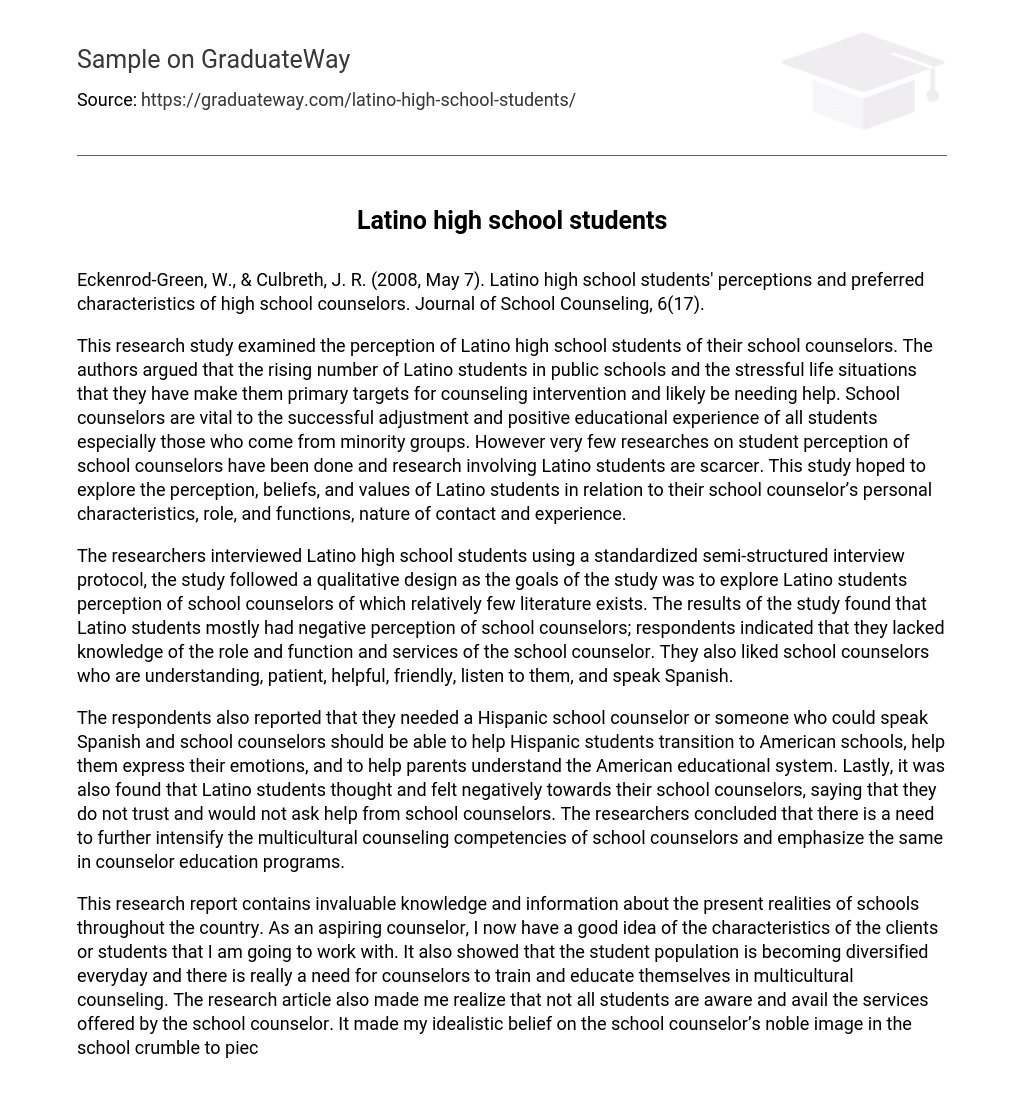Eckenrod-Green, W., & Culbreth, J. R. (2008, May 7). Latino high school students’ perceptions and preferred characteristics of high school counselors. Journal of School Counseling, 6(17).
This research study examined the perception of Latino high school students of their school counselors. The authors argued that the rising number of Latino students in public schools and the stressful life situations that they have make them primary targets for counseling intervention and likely be needing help. School counselors are vital to the successful adjustment and positive educational experience of all students especially those who come from minority groups. However very few researches on student perception of school counselors have been done and research involving Latino students are scarcer. This study hoped to explore the perception, beliefs, and values of Latino students in relation to their school counselor’s personal characteristics, role, and functions, nature of contact and experience.
The researchers interviewed Latino high school students using a standardized semi-structured interview protocol, the study followed a qualitative design as the goals of the study was to explore Latino students perception of school counselors of which relatively few literature exists. The results of the study found that Latino students mostly had negative perception of school counselors; respondents indicated that they lacked knowledge of the role and function and services of the school counselor. They also liked school counselors who are understanding, patient, helpful, friendly, listen to them, and speak Spanish.
The respondents also reported that they needed a Hispanic school counselor or someone who could speak Spanish and school counselors should be able to help Hispanic students transition to American schools, help them express their emotions, and to help parents understand the American educational system. Lastly, it was also found that Latino students thought and felt negatively towards their school counselors, saying that they do not trust and would not ask help from school counselors. The researchers concluded that there is a need to further intensify the multicultural counseling competencies of school counselors and emphasize the same in counselor education programs.
This research report contains invaluable knowledge and information about the present realities of schools throughout the country. As an aspiring counselor, I now have a good idea of the characteristics of the clients or students that I am going to work with. It also showed that the student population is becoming diversified everyday and there is really a need for counselors to train and educate themselves in multicultural counseling. The research article also made me realize that not all students are aware and avail the services offered by the school counselor. It made my idealistic belief on the school counselor’s noble image in the school crumble to pieces. In fact, I would know now that when I become a school counselor, I must be able to make myself visible to the student population, to advertise and promote the school counseling services to all students and to strategically encourage students to come to the counseling office.
This research study significantly contributes to the counseling profession by studying how students perceive school counselors. It is an important contribution because there has been little attention given to this area of concern and knowing how clients perceive school counselors would help in the development of strategies and programs that would better cater to the specific needs of the clients. Moreover, the research also calls into attention the fact that minority students have not been given the support and help that they badly needed as the school counselor had been more focused on mainstream students. Lastly, the research had provided evidence of the need to intensify multicultural counseling skills in all school counselors and that in most school guidance programs multicultural counseling is not implemented.
Based on the research findings, the researchers concluded that there is a need to emphasize multicultural counseling competencies in all school counselors especially in counselor education programs. It was also recommended that the study be replicated using sample of students from a larger population and different geographical locations to determine whether the said results are consistent for all Latino students. This research has also questioned the efficacy of school guidance programs to provide services to students of different ethnicities, more research is needed to evaluate school guidance programs in schools that have highly diverse student populations.
The weaknesses of the research study includes the small sample size, only 8 students were interviewed for the whole school considering that almost eleven percent of the school population were Hispanic. Although, the researchers were careful enough to include both genders in the sample, it is still too small even if the study adopted a qualitative approach. Another weakness of the study is that the interviews were conducted in English while it was apparent that the respondents were more comfortable speaking in Spanish, thus the risk that some vital information or the quality of responses had been compromised by the language barrier.
References
Eckenrod-Green, W., & Culbreth, J. R. (2008, May 7). Latino high school students’ perceptions
and preferred characteristics of high school counselors. Journal of School Counseling, 6(17). Retrieved November 8, 2008, from http://www.jsc.montana.edu/articles/v6n17.pdf





